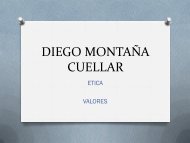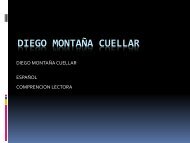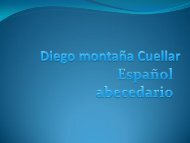2
You also want an ePaper? Increase the reach of your titles
YUMPU automatically turns print PDFs into web optimized ePapers that Google loves.
ENSEÑAR A LOS ESTUDIANTES A<br />
CONJUGAR EL VERBO TO BE
ESFERO<br />
CUADERNO
Ponga en las siguientes formas de ser<br />
(am, son, es) en las lagunas. No utilice<br />
Formas cortas / contraídas<br />
EJEMPLO<br />
He __ a boy.<br />
Answer: He is a boy.
1) My mother in the kitchen.<br />
2) The pupils not at school today.<br />
3) Maria's grandmother from Brazil.<br />
4) I a football fan.<br />
5) It Sunday today.<br />
6) They in the car.<br />
7) His pencil case at home.<br />
8) you from Sheffield?<br />
9) I not your friend.<br />
10) Hey John! We here.
En esta parte podrás aplicar lo aprendido, practicar y comprobar que<br />
recuerdas<br />
tanto el vocabulario como la gramática de la lección. Si cometes<br />
errores, se<br />
recomienda repasar los temas y volver a realizar los ejercicios.<br />
1.Completa los recuadros con las conjugaciones correctas del<br />
verbo TO BE.<br />
1. My name James.<br />
2. Mary the secretary.<br />
3. John and Lucy at school.<br />
4. I a student.<br />
5. The boys in the garden.
6. He a lawyer.<br />
7. Susie a housewife.<br />
8. She a student.<br />
9. They my friends.<br />
10. You a student.<br />
2.Completa colocando el verbo entre paréntesis en Simple<br />
Present o Simple Past.<br />
1. Everyday I (go) to school.<br />
2. Last year we (visit) our<br />
grandchildren.<br />
3. Jane often (cook) a meal for her<br />
husband.
5. Last week, Rob (buy) a new car.<br />
6. I (send) three letters yesterday.<br />
7. We (invite) our family for dinner last night.<br />
8. We always (invite) our family for dinner<br />
on Sundays.<br />
9. Jane usually (take) the bus.<br />
10. Yesterday, Jane (take) the train.
En este ejercicio podrás practicar el uso correcto de los verbos. Lee<br />
atentamente<br />
las oraciones y completa los recuadros con las formas correctas de los<br />
verbos que<br />
se encuentran entre paréntesis.<br />
* I work in a big office with twenty other people. We (spend) all the<br />
day together.<br />
* I (like) most of them except for Neil.
Every day he (spend) one hour talking about his holidays. Last year,<br />
he (go)<br />
to Germany.<br />
He (spend) a month there, and he (visit) many places. He (rent) a<br />
car<br />
and he (drive) across the country. Now he (want) to go to some<br />
other<br />
country.<br />
At 12.30 I usually (go) out for lunch with Helen, the secretary. She<br />
(work)<br />
from 8am to 8pm. Last week, she (stay) until 9pm to finish her<br />
work. Today,<br />
she (have) a lot of things to do at home but she (want) to stay<br />
late again.
* Escoge la respuesta correcta.<br />
1. She ___ four languages.<br />
a. speak<br />
b. speaks<br />
2. Jane is a teacher. She ___ French.<br />
a. teach<br />
b. teaches
2. Jane is a teacher. She ___ French.<br />
a. teach<br />
b. teaches<br />
4. I always ___ the window at night because it is cold.<br />
a. close<br />
b. closes<br />
5. Those shoes ___ too much.<br />
a. cost<br />
b. costs
6. The food in Japan is expensive. It ___ a lot to live there.<br />
a. cost<br />
b. costs<br />
7. His job is great because he ___ a lot of people.<br />
a. meet<br />
b. meets<br />
8. He always ___ his car on Sundays.<br />
a. wash<br />
b. washes
9. My watch is broken and it ___ to be fixed again.<br />
a. need<br />
b. needs<br />
10. I ___ to watch movies.<br />
a. love<br />
b. loves<br />
11. I ___ to the cinema at least once a week.<br />
a. go<br />
b. goes<br />
12. They never ___ tea in the morning.<br />
a. drink<br />
b. drinks
13. We both ___ to the radio in the morning.<br />
a. listen<br />
b. listens<br />
14. He ___ a big wedding.<br />
a. want<br />
b. wants<br />
15. George ___ too much so he's getting fat.<br />
a. eat<br />
b. eats<br />
16. The earth ___ round the sun, doesn't it?<br />
a. go<br />
b. goes
17. The shops in England ___ at 9:00 in the morning.<br />
a. open<br />
b. opens<br />
18. The post office ___ at 5:30 pm.<br />
a. close<br />
b. closes<br />
19. Jackie ___ two children now.<br />
a. has<br />
b. have<br />
20. Mr. Smith ___ too much. He always has a cigarette in his<br />
mouth.<br />
a. smoke<br />
b. smokes
21. When the phone ___, please answer it.<br />
a. ring<br />
b. rings
*ENCONTRAR LAS PALABRAS
INGRID BELTRAN<br />
11-02
https://drive.google.com/file/d/0B1boR<br />
MHyfWvjak9CY1RNOGZhYm8/view









